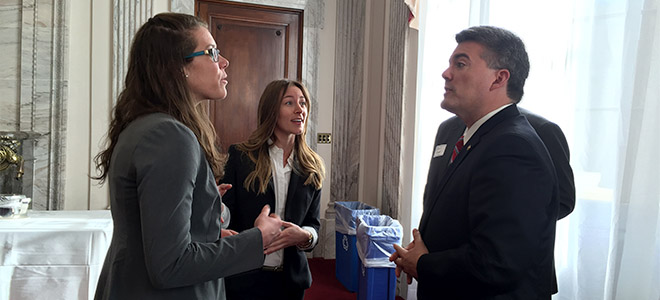For the third year the Center organized a competition to select two University of Colorado Boulder students to attend the AAAS Catalyzing Advocacy in Science and Engineering (CASE) Workshop in April. Students attending the three-and-a-half day program in Washington, DC, learn about the structure and organization of Congress, the federal budget and appropriations processes, and tools for effective science communication and civic engagement. In addition, students participate in interactive seminars about policy-making and communication. The day after the workshop, students will form teams and conduct meetings with their elected Members of Congress and congressional staff members, putting into practice what they have learned.
Following a highly competitive selection process the Center chose Angela Boag, a Ph.D. candidate in Environmental Studies, and Sarah Welsh-Huggins, a Ph.D. candidate in Civil Systems, Civil, Environmental and Architectural Engineering to attend the workshop (bios below). Congratulations to Angela and Sarah!
Angela E. Boag is a Ph.D. student at the University of Colorado Boulder investigating the relationships between climate change, forest management and land ownership. She has a Master’s in Forestry from the University of British Columbia and worked for environmental advocacy organizations before returning to graduate school.
Now a member of the Communities and Forests in Oregon (CAFOR) research project led by Dr. Joel Hartter, Angela is studying how changing climate and wildfire regimes impact forest resilience, as well as how private forest owners adapt to these changing conditions. She is passionate about linking social and biophysical research to solve complex problems, and advocates for policies that advance environmental sustainability.
Originally from Columbus, OH, Sarah Welsh-Huggins is a third-year Ph.D. candidate in the Civil Systems program within the Dept. of Civil, Environmental and Architectural Engineering. Her doctoral research assesses the economic and environmental life-cycle tradeoffs that arise from designing buildings to be both sustainable and hazard-resilient. At CU Boulder, Sarah has also completed a graduate certificate in Engineering for Developing Communities (EDC). Her EDC fieldwork in northeast India in 2014 led her to pursue a M.S. in Structural Engineering, consecutive to her Ph.D. studies, to investigate the seismic risk of hillside buildings in the Indian state of Mizoram. She is the current Co-President of CU Boulder’s student chapter of the national Earthquake Engineering Research Institute, which supports multi-disciplinary research and practice to reduce global earthquake risk. In 2012, Sarah earned a dual B.S./B.A. in Civil Engineering and International Studies from Lafayette College. Post-graduate school, her professional goal is to lead the creation of new approaches for holistic community and urban planning by improving communication channels between citizens, scientists, engineers, and policymakers. She seeks to promote sustainable community development through interdisciplinary solutions that protect natural resources, mitigate natural hazard risk, and ensure a safe and equitable future for generations to come.
A panel discussion with winners from the 2014 and 2015 competition, moderated by Abby Benson, Associate Vice President of Government Relations at the University of Colorado, was held February 4. For information about the competition and workshop, as well as testimonials from past competition winners, see our website. The competition is supported by the University of Colorado Graduate School and Center for STEM Learning.
To see more photos please see the current issue of Ogmius.


